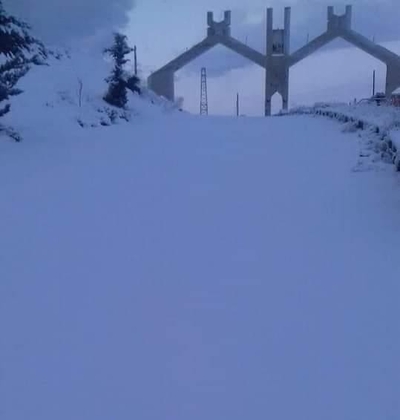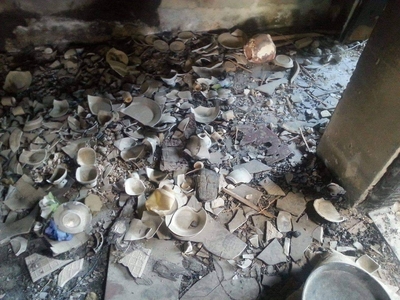The village of Bakh'a (also called al-Sarkha) in the Qalamoun region of Damascus countryside province is notable for the fact that its original inhabitants still speak Western Neo-Aramaic. The other two villages in Syria that bear this distinction are Jubb'adin and Maaloula. However, unlike the other two villages, Bakh'a was regrettably subjected to extensive damage during the war, resulting in the displacement of all of its original inhabitants. As of the time of writing, most if not all of the original inhabitants remain displaced. If any have returned, they only reside in the village on a temporary basis.
To learn more about Bakh'a, I conducted an interview with a person originally from Bakh'a and currently residing in the nearby town of Yabroud. While the person stresses that not all her information may necessarily be exact, it is clear that the basic outline above is correct.
This interview was conducted on 24 January 2020. Any parenthetical insertions in square brackets are my own.

Q: Can you tell me a little about the village of al-Sarkha generally? From where are the names of the village (al-Sarkha and Bakh'a), the number of inhabitants currently, how the Aramaic language survived in it until now etc.
A: It was called Bakh'a because in the time of the British and English [sic] occupation the people of the village stood against them and scolded them. And there is a water-well in the middle of the village they have called it Ayn Bakh'a. And the name of al-Sarkha: there was a person killed and an official came to the consolation and in as much as he heard screaming at the time of the janaza [funeral prayers], he called it al-Sarkha when it was put on the map and they changed the names of some of the villages in Qalamoun. The number of its inhabitants in 2013 was around 10,000. In March 2014 the people became displaced from it and a very great portion of it was destroyed during the war. Last year they allowed the people to enter it, and currently some of the people whose houses are still standing, they have begun to carry out repairs in them. The Aramaic language until now, all the people of Bakh'a speak it, but very few are those who know how to write it. There are important remains in it [the village].

Q: If I have understood your words, the village was a military zone until last year?
A: There have been military personnel on its periphery. And until now not all the people are allowed to enter it.
Q: How are the services like national grid electricity and water in the village?
A: Currently there are none, but the relevant authorities have begun working [on them].

Q: So the insurgents seized the village in 2013/2013? And afterwards it was liberated in 2014?
A: This I cannot tell you. I do not remember, but I remember the date of the displacement.
Q: I ask God that all its people should return one day.
A: Oh God, Ameen.
Q: Concerning the number of inhabitants currently, it is not known exactly?
A: Currently there are no inhabitants at all.
Q: I see, so some of the people have returned on a temporary basis: that is, they come and go.
A: They have allowed entry to it. Essentially there is nothing in it from the basics of life: no water, no electricity and no services at all. And three quarters of its houses are destroyed in the end. And the remaining quarter is not destroyed as a whole but stripped of everything.
Q: A saddening thing, by God.

A: Previously it was completely forbidden to enter it. It was even forbidden to bury the dead in it. Currently it has become possible.
Q: Most of the displaced from the village are in al-Sham [Damascus] currently?
A: It varies: a large portion are in Lebanon, some are in Yabroud, some are in al-Sham, and some have migrated and have come to Germany. And some have been distributed in the rest of the areas: Jubb'adin, al-Qutaifa, al-Tall and Hafir.
Q: Yes. Jubb'adin's inhabitants are in it and life goes on.
A: Jubb'adin essentially had no displacement or war in it.

